What is What
 | 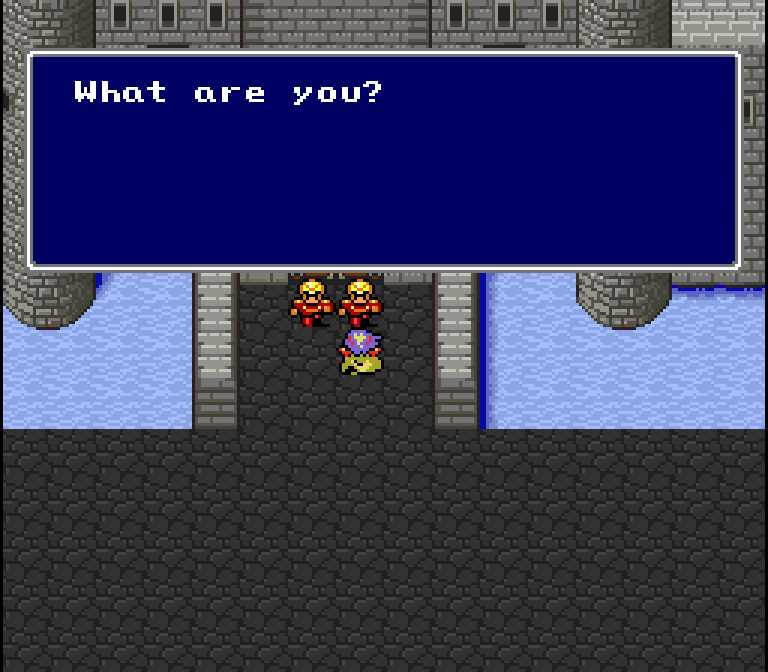 |
| Final Fantasy IV (Super Famicom) | Final Fantasy II (Super NES) |
Now that we’re back in Baron, let’s see what the guards at the castle are up to.
In Japanese, they say something like, “Who are you? Have you obtained authorization to pass?”
The first phrase very, very literally translates into, “What are you?” but in this context has the meaning of, “What do you want?” or “Who are you and why are you here?” It also has “kisama” here, which is a very rude version of “you”.
The official English version of this line is simply, “What are you?”
So we see that it not only takes the overly literal route, but leaves out the whole part about being able to get through if you have authorization. Not that it’s a big deal or anything, but being asked, “What are you?” is a pretty weird thing for one person to ask another.
This same mistranslation is made in other parts of the game as well, including back when you first meet Tellah.
Arrested Development
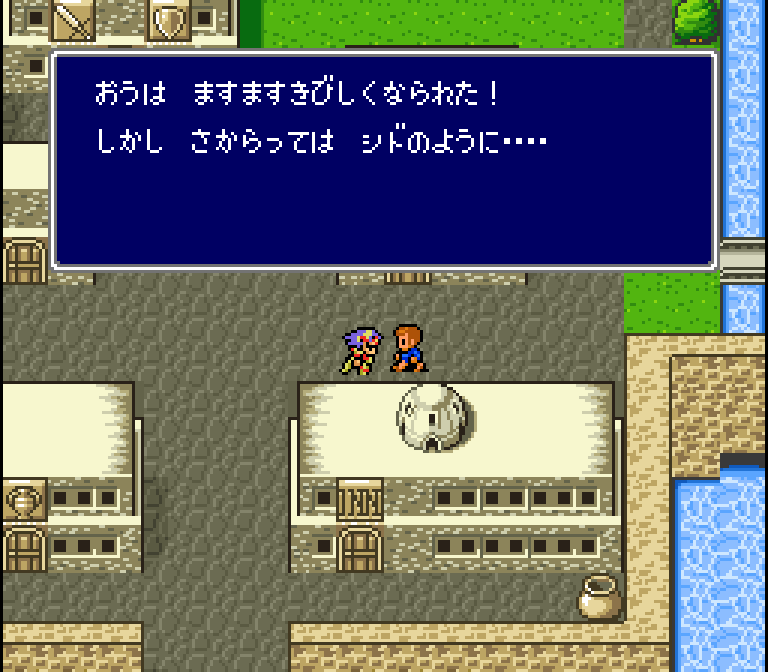 | 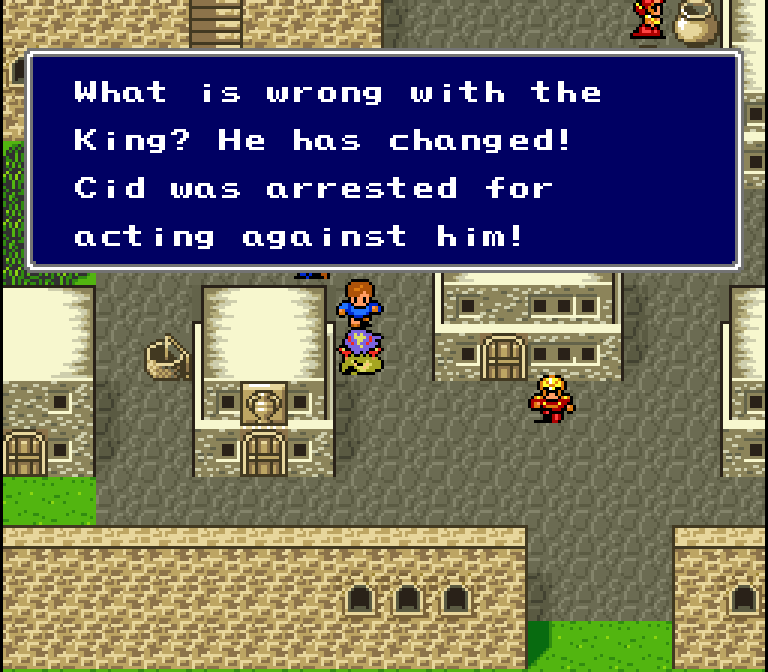 |
| Final Fantasy IV (Super Famicom) | Final Fantasy II (Super NES) |
This guy in Baron talks about how the king has gotten worse over time:
| Japanese Version (basic translation) | English Version |
| The king has become even more strict! | What is wrong with the King? He has changed! |
| But if we disobey him, we’ll wind up like Cid… | Cid was arrested for acting against him! |
If you remember, when you were first in Baron, the king was pretty strict, but now that a lot of time has passed, you learn in the Japanese version that he’s gotten even stricter.
In comparison, the English line sounds like the same complaints from the beginning of the game – about how the king doesn’t seem to be his normal self.
This isn’t a big deal at all, though. What’s more interesting is that in the English localization they added more details about what happened with Cid.
What’s interesting, though, is that for some reason this line says “Kain” instead of “Cid” in the GBA translation:
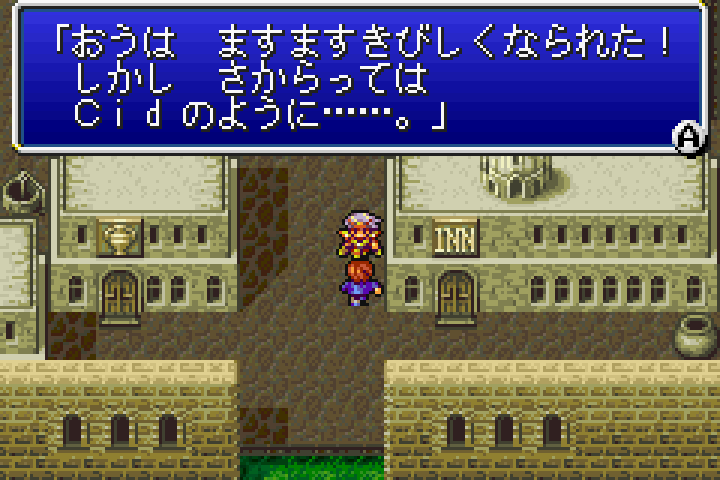 | 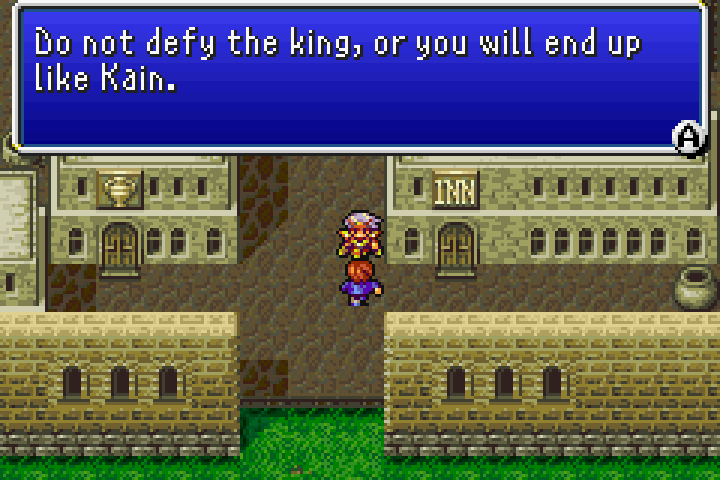 |
| Final Fantasy IV (GBA) | Final Fantasy IV (GBA) |
Don’t mind Cid’s name being in English in the Japanese screenshot there, I named him that for easy spotting. Anyway, my only guess is that this is due to a control code mistake at some point in the localization process and no one caught it.
The Karate Man Returns
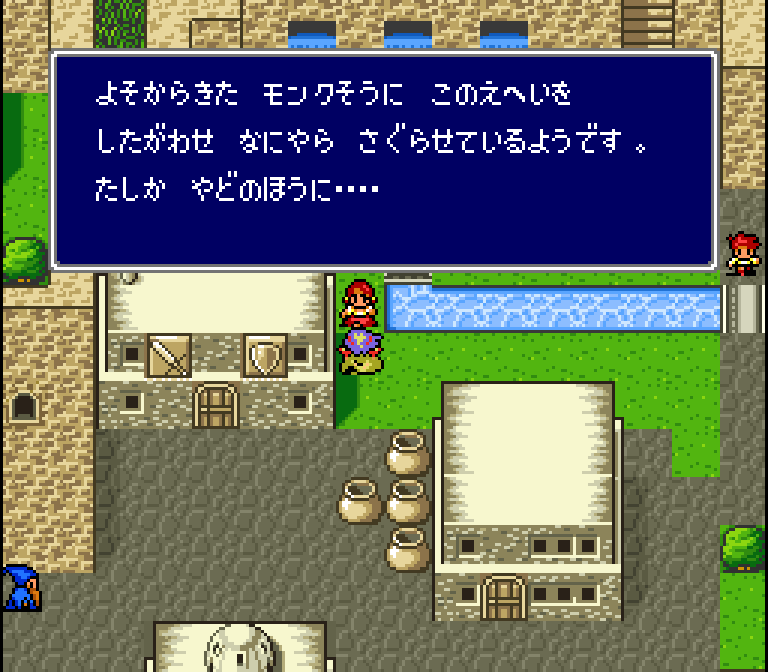 | 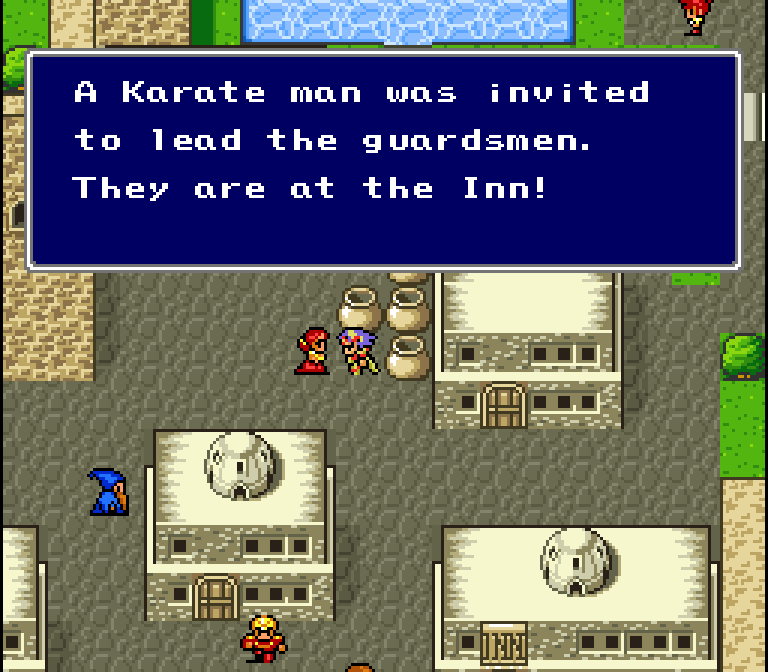 |
| Final Fantasy IV (Super Famicom) | Final Fantasy II (Super NES) |
This lady walking around outside has some interesting info for Cecil:
| Japanese Version (basic translation) | English Version |
| A foreign monk seems to be leading members of the Royal Guard in search of something. | A Karate man was invited to lead the guardsmen. |
| I believe he’s at the inn… | They are at the Inn! |
The first thing to pop out is the use of “Karate man” instead of “monk”. Actually, when I was a kid, the way this game capitalizes “Karate” all the time made me think it should always be capitalized. Nope, I was wrong!
But the big thing is that in the Japanese version she tells you that this monk and the Royal Guard are searching for something. What is that something? A crystal? Cecil? Something else?
Love that Knight
 | 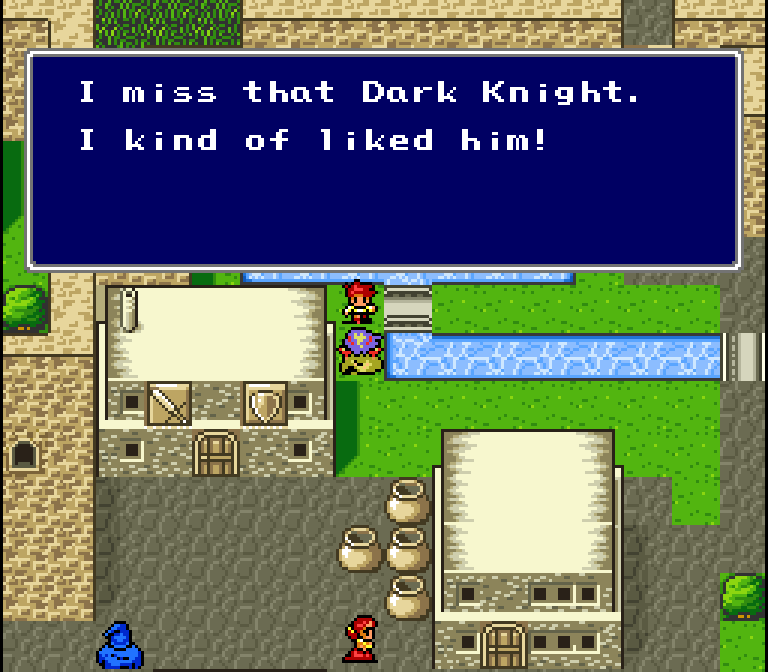 |
| Final Fantasy IV (Super Famicom) | Final Fantasy II (Super NES) |
The kid in Baron has some more localization fun surrounding him! Here’s what he says:
| Japanese Version (basic translation) | English Version |
| I wonder if that Dark Knight really did die. | I miss that Dark Knight. |
| I liked him. | I kind of liked him! |
Here we see that the reference to dying was cleaned up to just say that he misses the Dark Knight.
Also, it might be looking too deeply into it, but the use of “really” in the Japanese line makes it seem like he heard news of the Dark Knight dying at some point. If so, I’m guessing he heard about the ship being attacked at sea and assumes that Cecil died when the ship went down.
Dutiful Daughter
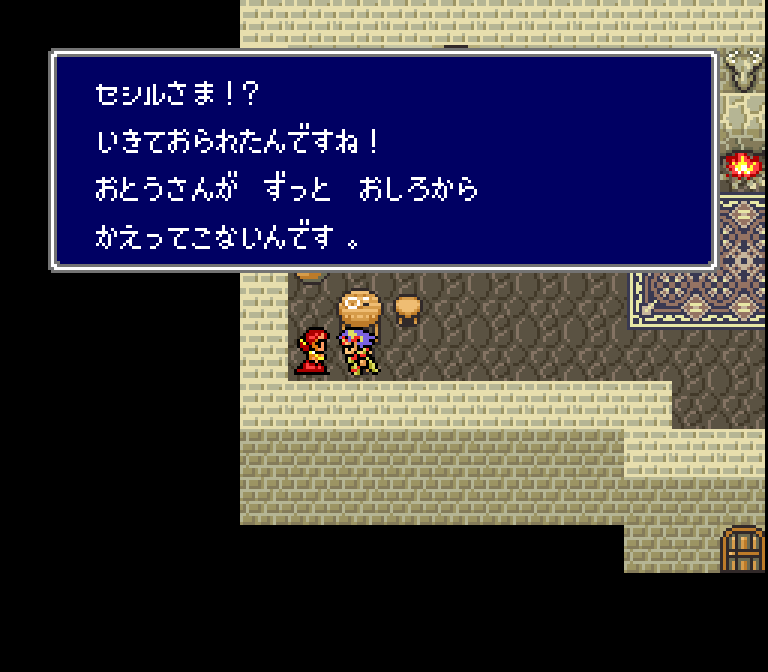 | 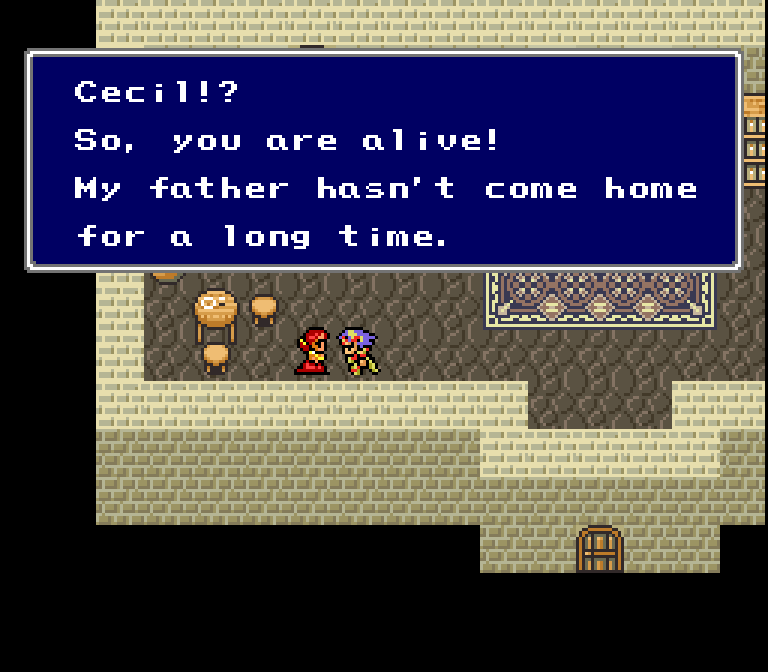 |
| Final Fantasy IV (Super Famicom) | Final Fantasy II (Super NES) |
It’s not much, but Cid’s daughter has some ever-so-slight differences in her text too.
| Japanese Version (basic translation) | English Version |
| Sir Cecil!? | Cecil!? |
| You’re alive! | So, you are alive! |
| My father has been at the castle a long time and hasn’t come back. | My father hasn’t come home for a long time. |
The points of interest here include:
- Cecil’s name modifier has been dropped in the translation. This seems to be common throughout the English translation.
- Similarly, in the Japanese version she speaks to Cecil in a very polite, formal way, as if addressing someone far superior to her. This nuance is missing in the English text.
- In the English version it sounds like he’s just maybe gone away on a trip or is staying at the bar for a really long time or something. The Japanese version makes it clear that he’s been stuck at the castle for a long time. Knowing that he’s in trouble, it sort of gives the player a vague hint of where you’ll need to go in the near future.
Still, even in the English version you can take this line and the other citizens’ lines to figure out that Cid’s in trouble at the castle, so the changes here are very minor in impact.
Do Not Come Here
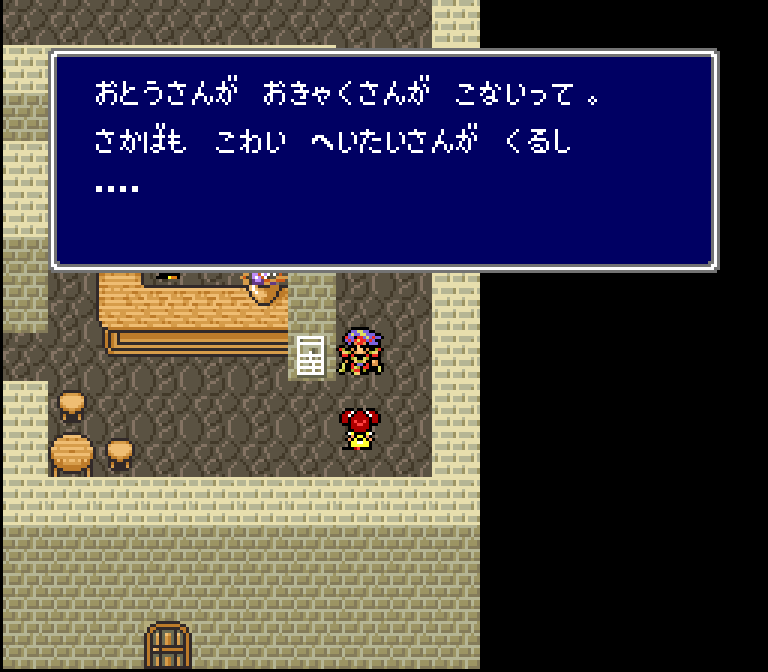 | 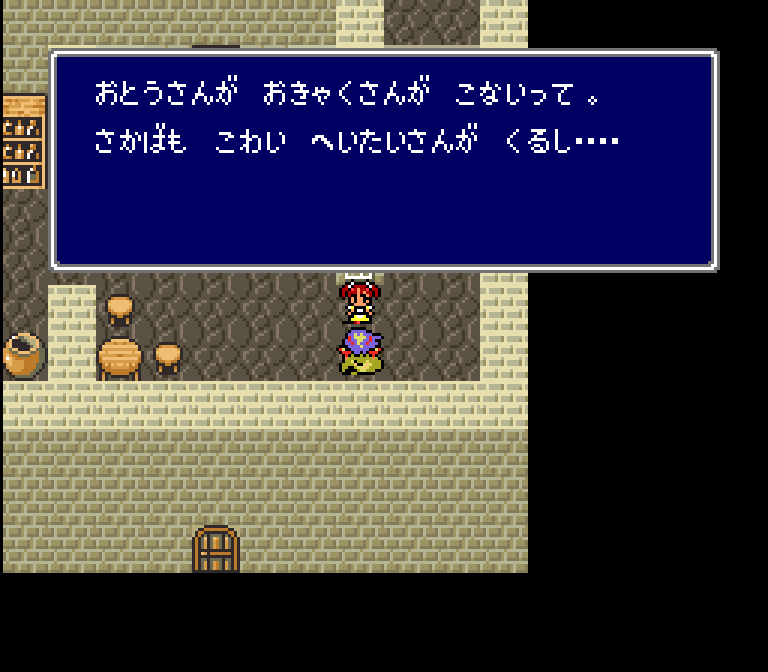 | 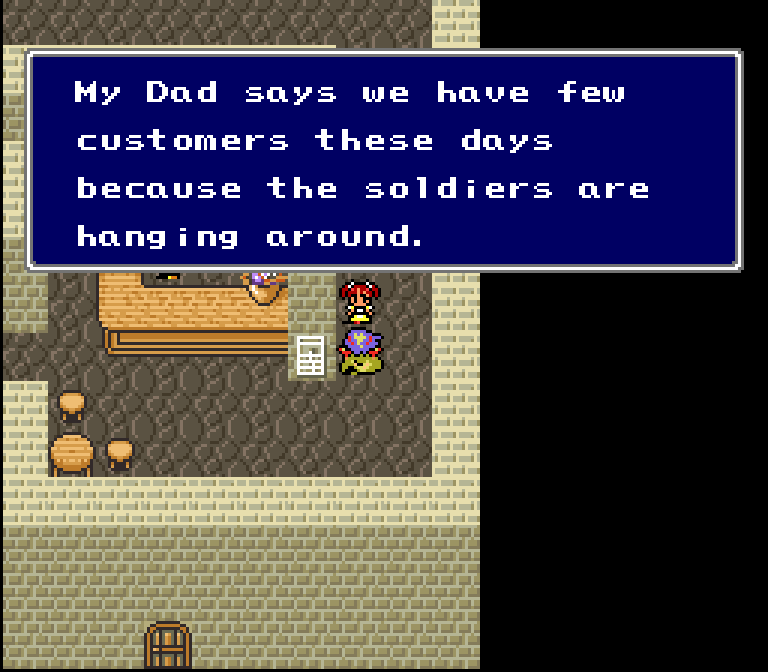 |
| Final Fantasy IV (Original) | Final Fantasy IV (Easy Type) | Final Fantasy II (Super NES) |
This kid near the Baron inn has a tiny text change:
| Japanese Version (basic translation) | English Version |
| My dad says we’re not getting any customers, what with scary soldiers coming to the pub and all… | My Dad says we have few customers these days because the soldiers are hanging around. |
Here we see that “Dad” is capitalized when it shouldn’t be, which isn’t a huge deal. The main things to focus on here are actually:
- The English version leaves out that the soldiers in question are scary.
- The English version leaves out the reference to the pub. They didn’t even change the reference to a cafe – it was just left out entirely.
This line always seemed a bit strange to me because there were no issues with the inn having customers when you were here earlier in the game as a mega-scary soldier. Maybe these new soldiers give off some sort of even scarier vibe or something, I dunno.
What I find more interesting, though, is that in Final Fantasy IV Easy Type, the Japanese ellipsis was repositioned to fit with the text. I wonder how it got on its own line in the original text in the first place.
Act Out
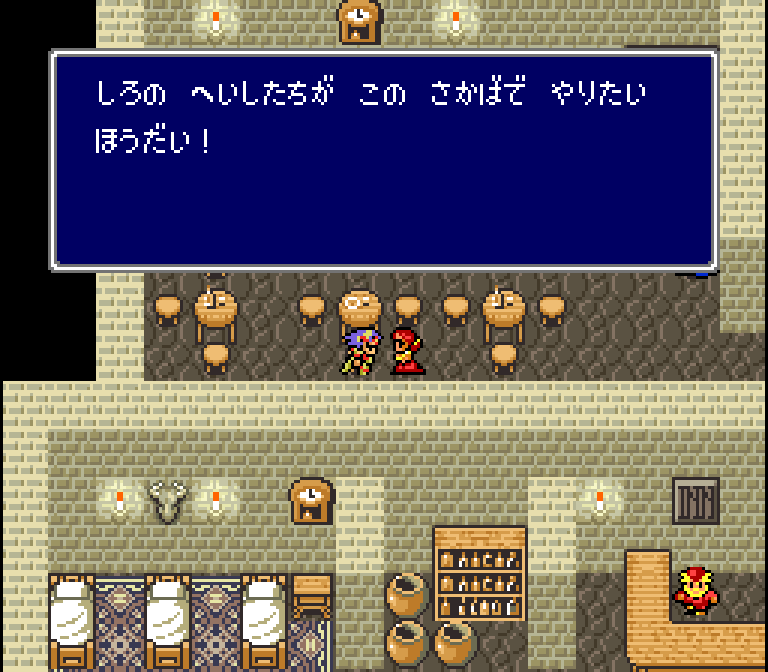 | 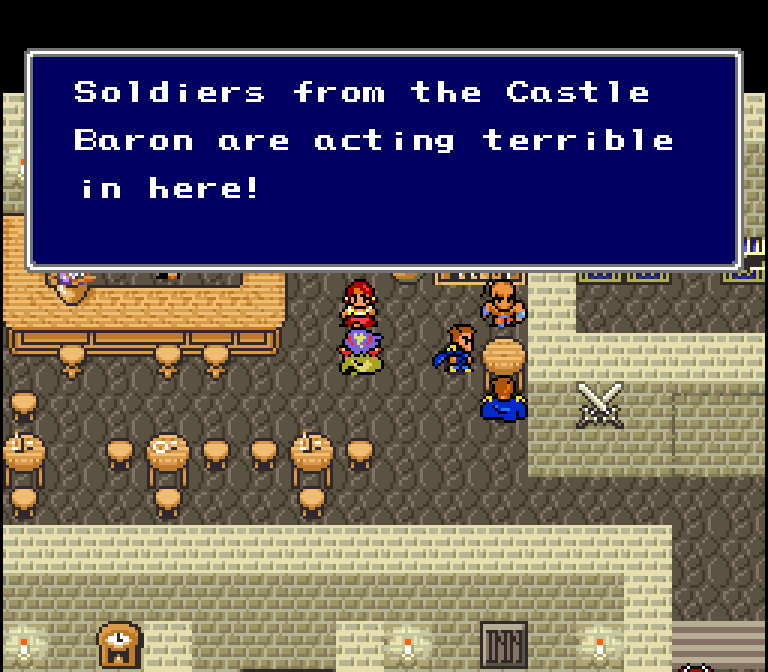 |
| Final Fantasy IV (Super Famicom) | Final Fantasy II (Super NES) |
Although it’s not much, I thought I’d point out what this lady at the pub says too.
In Japanese, she says something like, “Soldiers from the castle are doing whatever they please in this pub!” or “Soldiers from the castle are acting like they own this pub!”
In English, the pub reference is unsurprisingly removed: “Soldiers from the Castle Baron are acting terrible in here!”
Text Compaction
 | 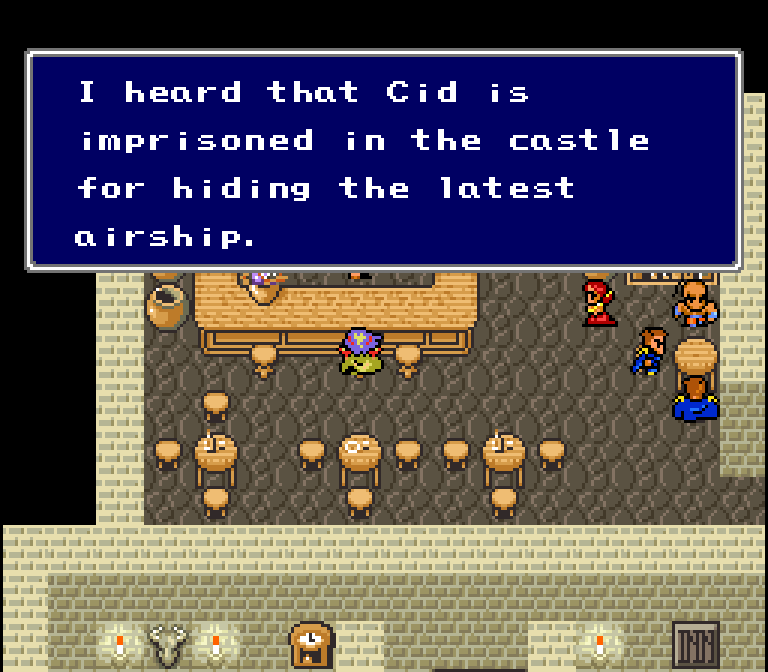 |
| Final Fantasy IV (Super Famicom) | Final Fantasy II (Super NES) |
The bartender has something to say about what’s happened to Cid:
| Japanese Version (basic translation) | English Version |
| They say Cid’s being held prisoner in the castle! Apparently he hid the newest, most highly advanced airship somewhere. | I heard that Cid is imprisoned in the castle for hiding the latest airship. |
There’s little to say about this – because it’s actually really good!
One of the hardest parts of Japanese-to-English translation is compacting everything down into something that doesn’t sound like “translation-ese” and can fit into as little space as possible. This is a really good example of that. Good job, whoever was responsible!
Booze Who?
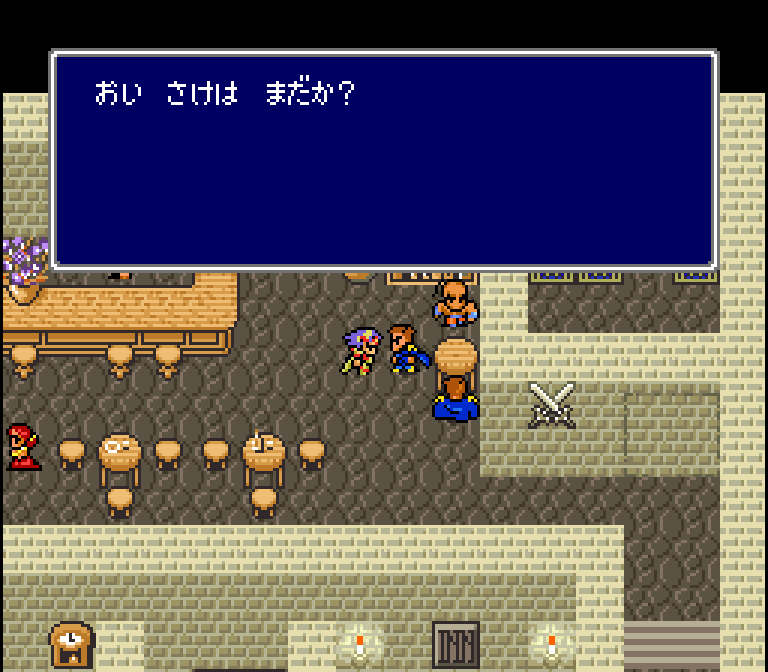 | 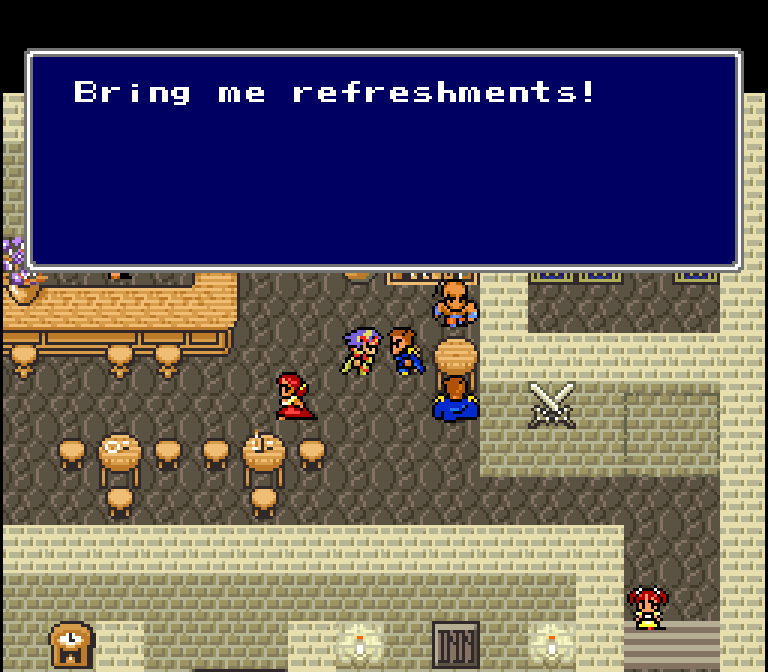 |
| Final Fantasy IV (Super Famicom) | Final Fantasy II (Super NES) |
The Baron soldiers here have some slight localization changes:
| Japanese Version (basic translation) | English Version |
| Hey! Where’s my booze! | Bring me refreshments! |
| Who are you?! | Who are you? |
The alcholic reference was unsurprisingly removed and replaced with “refreshments”. Which seems like a funny word for someone rude to yell, but that gives it charm I think.
Also, remember the various times so far where the translators would use the literal translation, “What are you?” Well, they finally got it right this time!
This inconsistency is a bit strange, but maybe it’s due to different translators working on different parts of the script. For reference, later translations handle all these “What are you?” lines much better and bring across the proper nuance even more clearly.
Yang Time
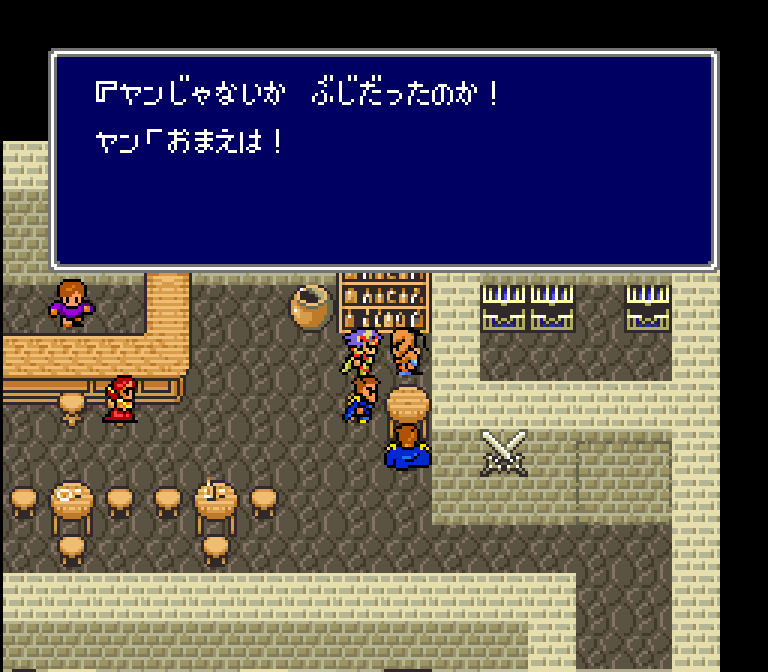 | 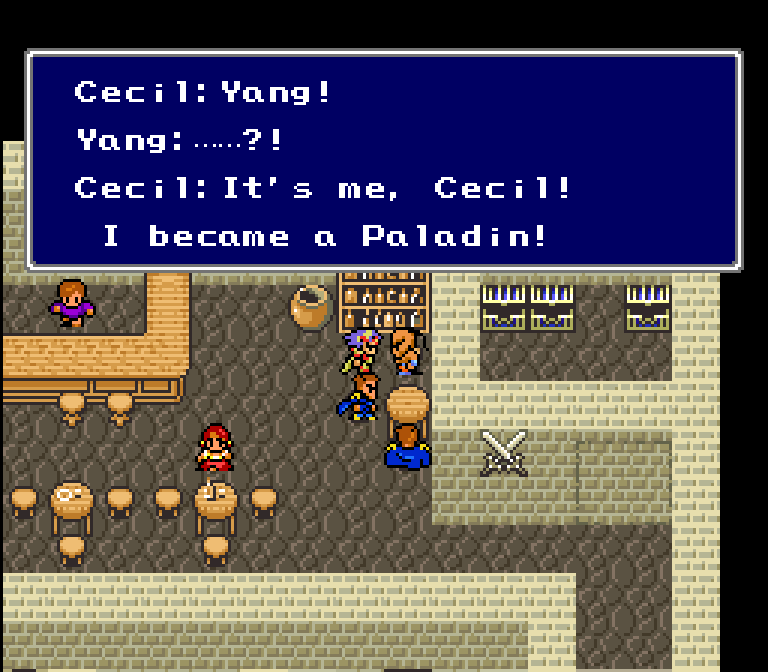 |
| Final Fantasy IV (Super Famicom) | Final Fantasy II (Super NES) |
Sitting with the Baron soldiers is Yang! Except he seems different. Here’s a look at how this conversation goes in Japanese and in English:
| Japanese Version (basic translation) | English Version |
| Cecil: Yang! It’s you! You’re all right! | Cecil: Yang! |
| Yang: You! | Yang: ……?! |
| Cecil: Oh, do you not recognize me because I’m a Paladin now? It’s me, Cecil! | Cecil: It’s me, Cecil! I became a Paladin! |
| Yang: Cecil! I’ve been looking for you! | |
| You wretched, king-defying dog! | |
| Get him! | Yang: Get him! |
| Royal Guards: Yes, sir! | Guards: Yes, sir! |
Here, we see a few things of interest:
- Yang has some lines completely missing in the English translation. These show that he has real hatred for Cecil and is acting out of loyalty for the king of Baron. Still, even without these lines you can tell he’s not acting normally. In a way, I actually prefer it without the extra lines – it makes everything just a tad more disorienting and gives it a little bit more of a “WTF is going on here?!” vibe. But I also do feel that having him show a mysterious loyalty to the king of Baron ties in well with the whole king thing that’s coming up soon in the game.
- Yang seems confused at first in the English translation rather than seething and surprised. He also doesn’t insult Cecil in the English script.
- If Yang was searching for Cecil even though he’d been presumed dead earlier (as indicated by the boy outside), then we can assume he’s been specially informed by or through Golbez or Kain that Cecil is alive. That’s just an interesting thought I’d never had before, maybe because I never really paid attention or because these tiny connections don’t exist in the English translation.
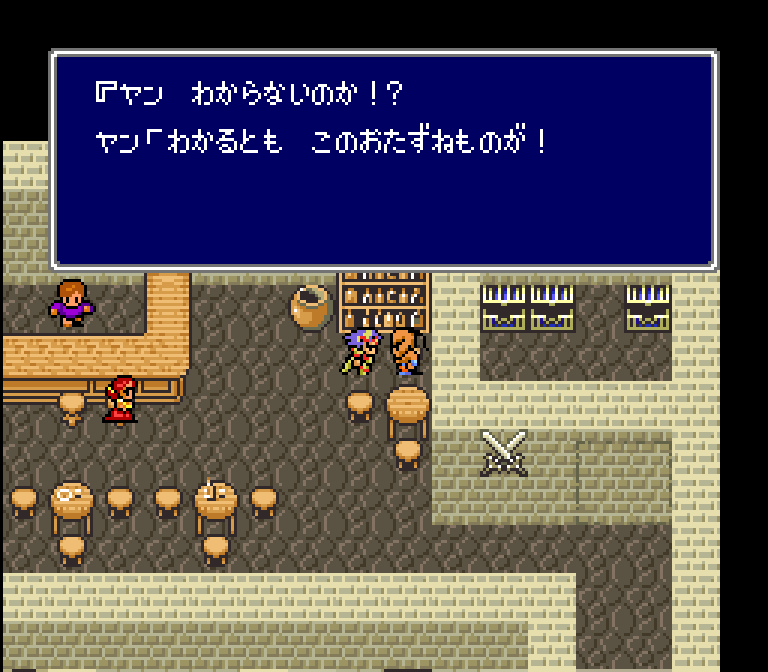 | 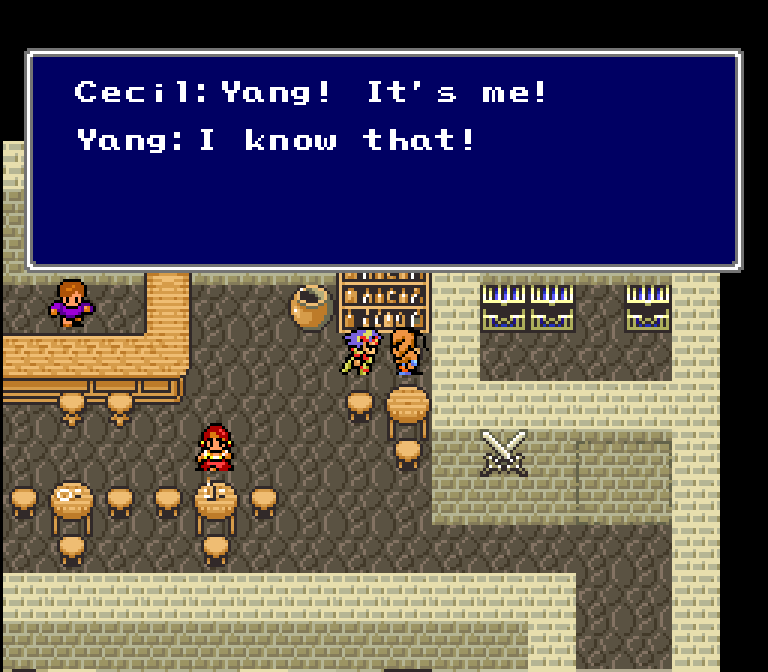 |
| Final Fantasy IV (Super Famicom) | Final Fantasy II (Super NES) |
After the battle with the two Baron guards, the conversation continues:
| Japanese Version (basic translation) | English Version |
| Cecil: Yang! Don’t you recognize me!? | Cecil: Yang! It’s me! |
| Yang: Of course I do, you wanted fugitive! | Yang: I know that! |
This particular change feels like your standard case of needing to trim down text due to space limitations.
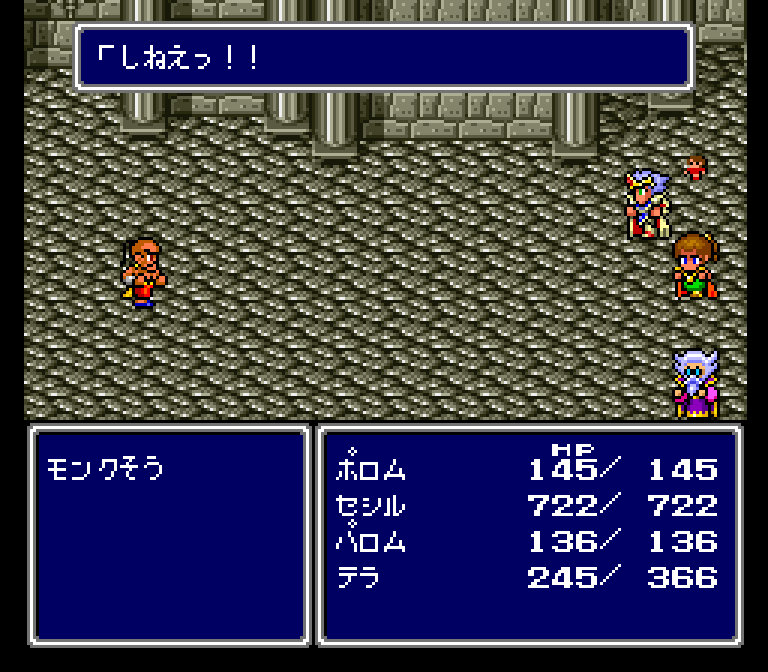 | 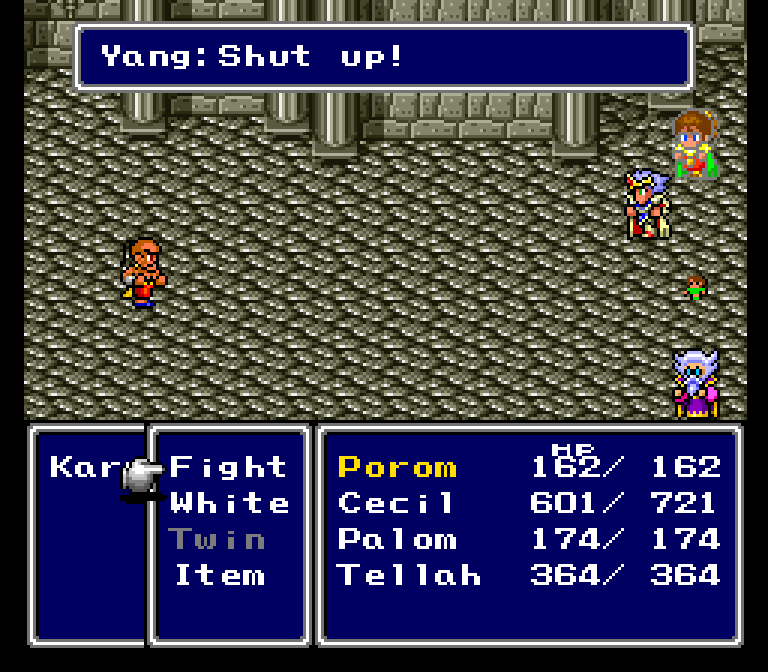 |
| Final Fantasy IV (Super Famicom) | Final Fantasy II (Super NES) |
Now the real fight begins with Yang himself!
During the battle, he says in Japanese, “Die!!”
In the English translation, this was changed to, “Shut up!”
I also always found it funny that they call him a “Karate” in the English translation, as if you’re fighting the martial art itself. In the Japanese text, it says “Monk” or “Monk-Priest”.
Incidentally, I’m told that Yang’s script is set to attack Cecil, except the programmers accidentally have it try to attack Dark Knight Cecil, who isn’t in your party anymore. As a result, two lines of battle text go unused.
Here’s a look at the fixed scene, courtesy of Dragonsbrethren:
Yang seems to use a sword here for some reason, but I’m not sure why.
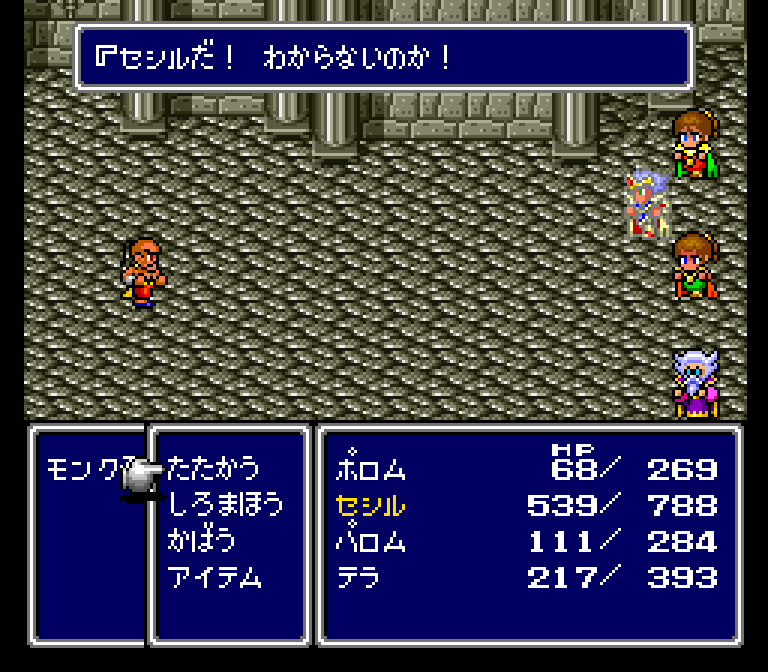 | 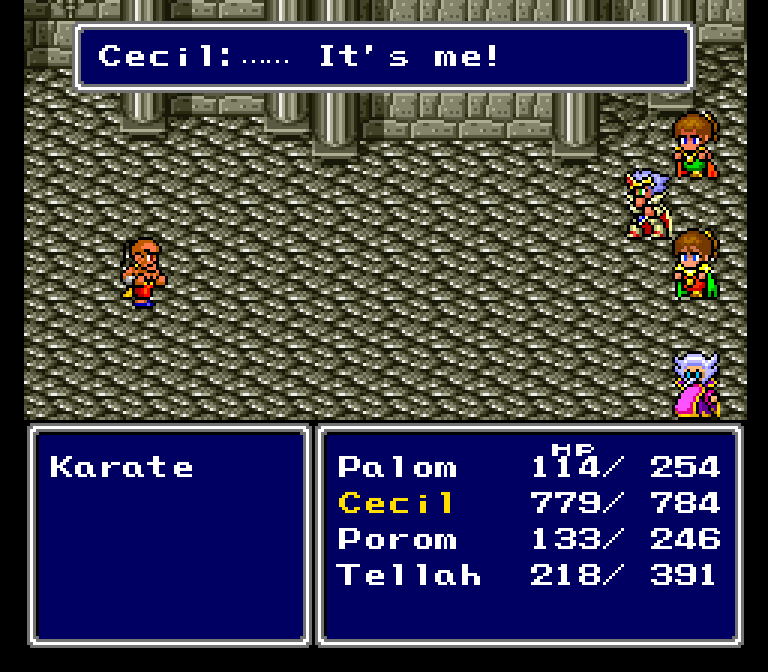 |
| Final Fantasy IV (Super Famicom) | Final Fantasy II (Super NES) |
For reference, though, here’s a comparison of these unused lines in Japanese and in English:
| Japanese Version (basic translation) | English Version |
| Cecil: Come to your senses, Yang! | Cecil: Come on, Yang! |
| Cecil: It’s me, Cecil! Don’t you recognize me?! | Cecil: …… It’s me! |
This text is also unused in the PlayStation version as:
Cecil: Yang!
Cecil: It’s me!
Yang Goes Good
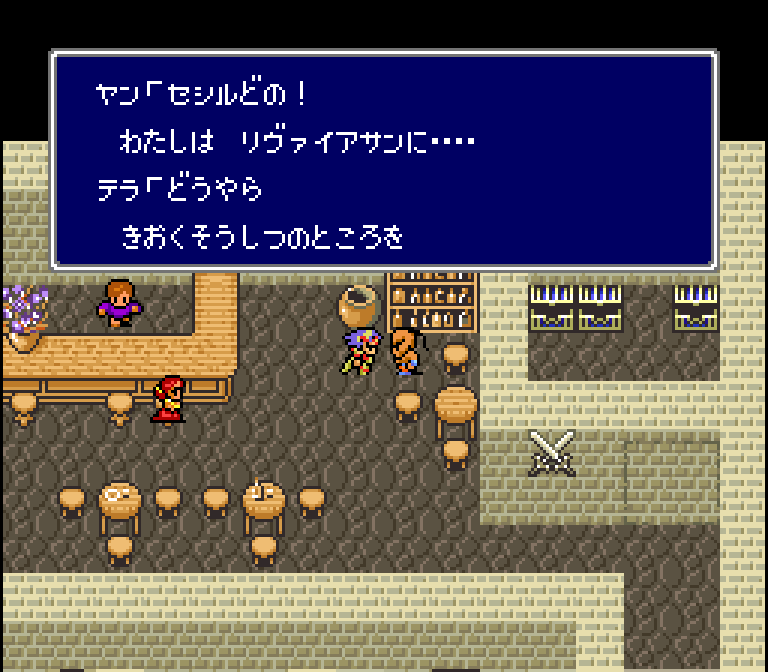 | 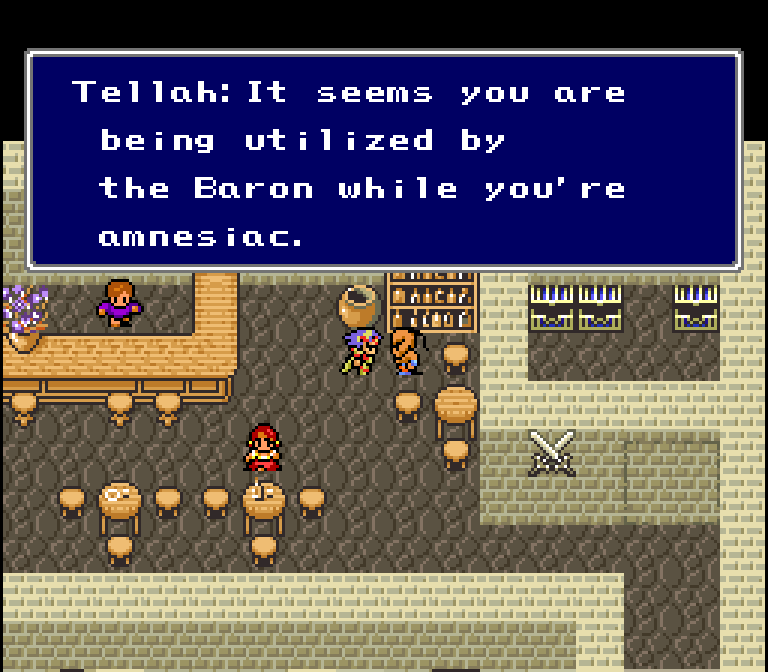 |
| Final Fantasy IV (Super Famicom) | Final Fantasy II (Super NES) |
Once he’s been beaten up enough, Yang finally comes to his senses and apologizes to Cecil and company.
| Japanese Version (basic translation) | English Version |
| Yang: Sir Cecil! Leviathan caused me to… | Yang: Cecil! Leviatan attacked us and I don’t remember what happened after that. |
| Tella: It would appear that Baron was taking advantage of your memory loss. | Tellah: It seems you are being utilized by the Baron while you’re amnesiac. |
| Yang: ….I am in your debt. | Yang: I am sorry. |
| Cecil: What of Rydia and Gilbert!? | Cecil: Where’s Rydia and Edward!? |
| Yang: Rydia was swallowed by Leviathan. | Yang: Rydia was swallowed by Leviatan. |
| As for Gilbert…. I don’t know…. | I don’t know what happened to Edward. |
| Cecil: I see…. | Cecil: I see. |
| Yang: Where are we? | Yang: Where am I? |
| Cecil: Baron. | Cecil: We are in Baron. |
| It’d be bad if the soldiers overheard us. | Soldiers will hear us. |
| Let’s formulate a plan in private! | Let’s talk over there. |
| Monk-Priest Yang joined the party! | Yang joined the Party! |
There’s nothing too major in here, but in the spirit of nitpickiness let’s take a look anyway:
- As per usual, “Sir Cecil” is now just “Cecil” in the English version. In Yang’s case, the use of such words – along with the way he speaks in Japanese – helps show his discipline and respect.
- In the Japanese version, Yang starts to say that the encounter with Leviathan did something to him. But, because of the way Japanese works, it’s left as an incomplete, verb-less sentence and the rest is up to the reader to figure out. This is always a tough and tricky thing to try to work with when translating because incomplete sentences like this are extremely common in Japanese. One approach is to just turn incomplete sentences into complete sentences by trying to fill in the blanks to the best of your ability. Of course, this becomes a guessing game, and there’s always a chance you’ll be completely wrong. In this case, for instance, it’s possible Yang was actually going to say, “Leviathan ate my brains and then I forgot who I was.” The likeliness of that being the case, though, is so low that as a translator you’d never guess it. So this “fill in the blanks” approach is best used when you’re able to play it safe.
In this instance, we see that the official translation uses the “fill in the blanks” approach and then plays it safe by restating what the player already knows. There’s nothing wrong with this, I just thought it might be worth pointing out that Japanese-to-English translation involves a lot of guesswork, maybe more than other languages to English.
I’m actually pleased to see this much thought put into the translation! - The English line about Yang having lost his memory is awkwardly phrased. It’s also strange how this sentence starts with a basic English mistake like “the Baron” and then ends with a complicated word like “amnesiac” that no non-native English speaker would know off the top of their head. Tellah is also given the wrong verb tense here when he uses “are” rather than “were”. Besides that, there are some more nitpicky nuance things with this line that aren’t really important enough to cover.
- In the Japanese version, Yang pauses mid-sentence when talking about Rydia and Gilbert/Edward, presumably because he’s upset or sad. In the English translation, he just states it matter-of-factly.
- “Party” is capitalized in the English translation for some reason.
Come On Inn
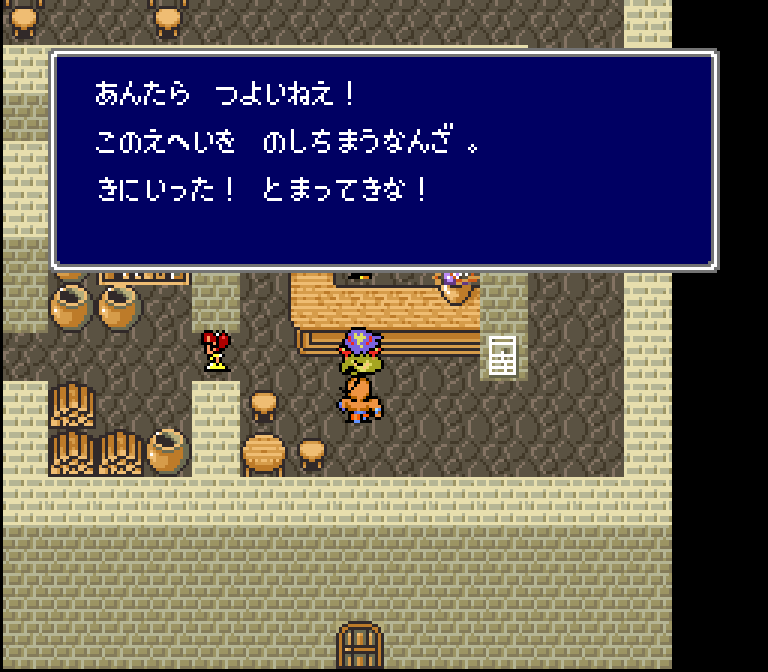 | 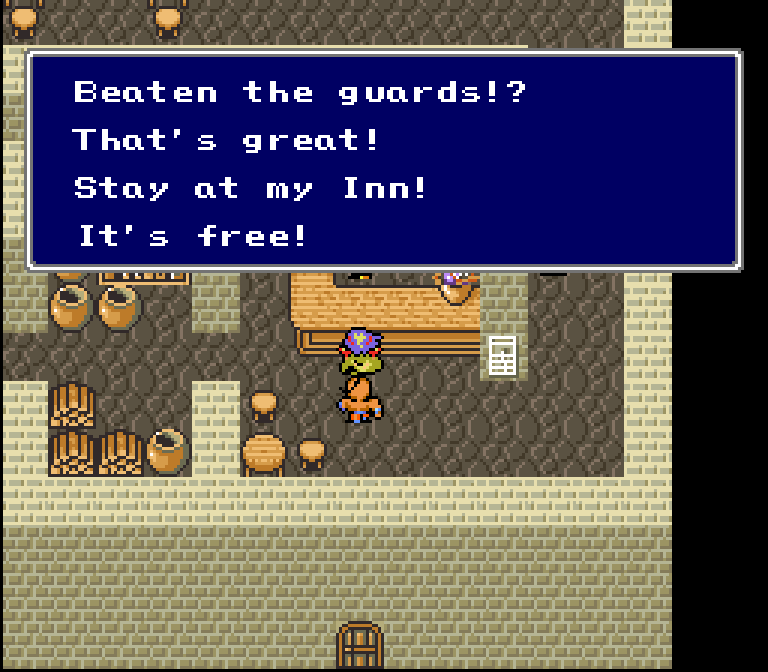 |
| Final Fantasy IV (Super Famicom) | Final Fantasy II (Super NES) |
After the brief talk, Cecil, Yang, and the others go to the guy running the inn.
In Japanese, this guy talks in a non-standard way that also has a warm, friendly vibe to it. Something like, “You guys sure are strong, knockin’ out them Royal Guard soldiers like that! I like ya! Stay the night here!”
In English, the non-standardness of his speech style is missing just because of how Japanese and English differ. But it also has a “this was a very early-era translation” feel to it too: “Beaten the guards!? That’s great! Stay at my Inn! It’s free!”
Besides the various nuance differences introduced by the translation, there’s also another odd use of capitalization here with “my Inn”. In all, it’s not a big deal or anything, but it’s interesting to see how even unimportant lines come across to the original target audience.
Plan of Action
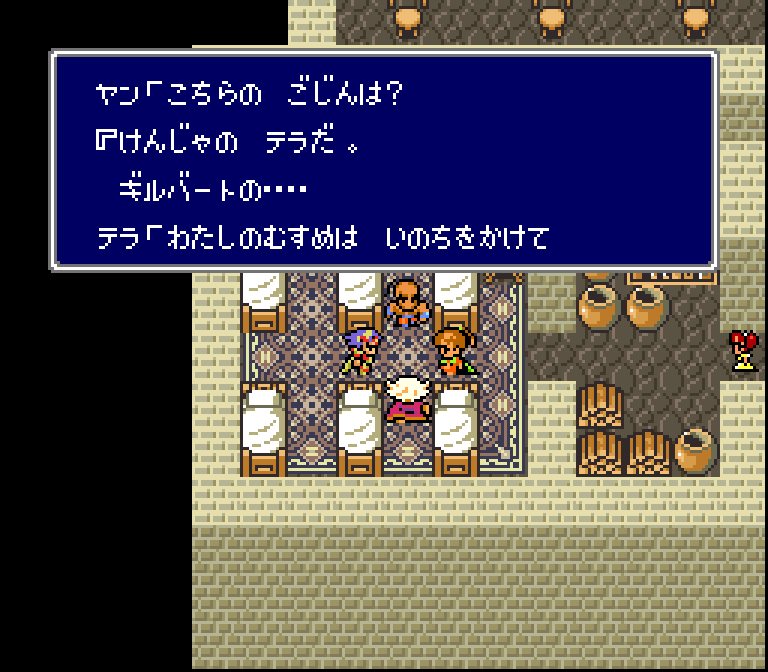 | 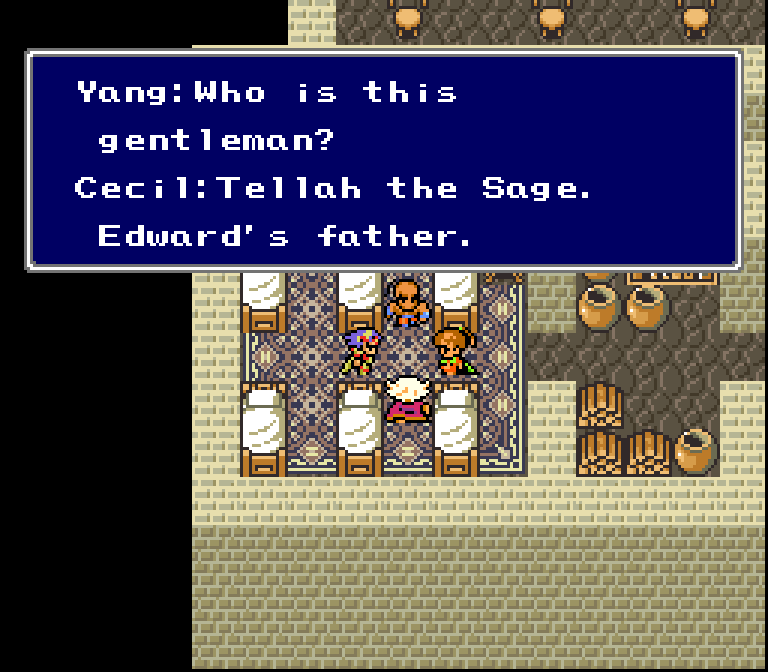 |
| Final Fantasy IV (Super Famicom) | Final Fantasy II (Super NES) |
Once the party can talk in private, there’s a lot to say.
| Japanese Version (basic translation) | English Version |
| Yang: Who is this gentleman? | Yang: Who is this gentleman? |
| Cecil: Tella the sage. Gilbert’s…. | Cecil: Tellah the Sage. Edward’s father. |
Wait what what what?!
I don’t know. Maybe I’m just seeing things. Let’s check that again…

Nope, I’m not seeing things. Tellah is Edward’s father in the English version. Fanfic writing squad… activate!
All kidding aside, this is probably one of the biggest mistakes in the game’s translation. I’m actually surprised that so few people ever bring it up and instead focus on the whole “spoony bard” thing. Luckily, this mistake was fixed when the game was released again on the PlayStation years later.
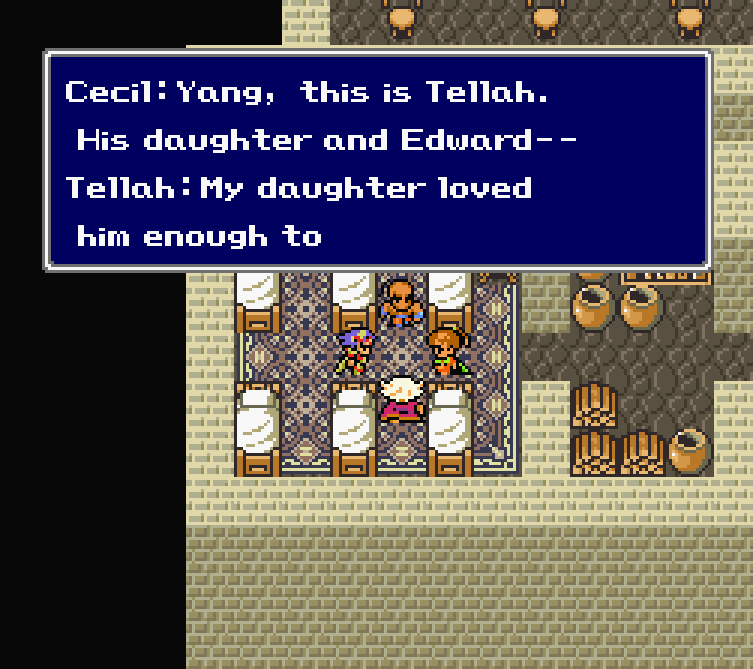
It’s been fixed in every other English release since then as well.
Anyway, let’s continue with the conversation!
| Japanese Version (basic translation) | English Translation |
| Tella: My daughter loved him and sacrificed her life for him…. | Tellah: My daughter loved him… even sacrificing her own life. |
| Yang: I see. | Yang: I see. |
| I am Yang, the head monk-priest of Fabul. | I am a Karate Master of Fabul. |
| Palom: I’m Palom, the Mysidian prodigy! | Palom: I’m the Mysidian genius, Palom! |
| Porom: I apologize for his brashness. I’m his twin, Porom. | Porom: Please do not mind him. I am his twin sister Porom. |
| Palom: Man! I can’t believe you just let lousy ol’ Baron use you like that! | Palom: You hurt us, man! |
Whoa, wait a minute, there’s a definite translation mistake right there. Palom gives Yang an indirect insult in the Japanese version, but in the translation winds up saying that Yang hurt them in the battle just a few minutes earlier. Porom also reacts by saying, “Stop it!”, which makes a little more sense in the Japanese context.
Anyway, for fun, I checked the PlayStation translation to see how this was handled, and it’s become, “Hey, that kick really hurt!”
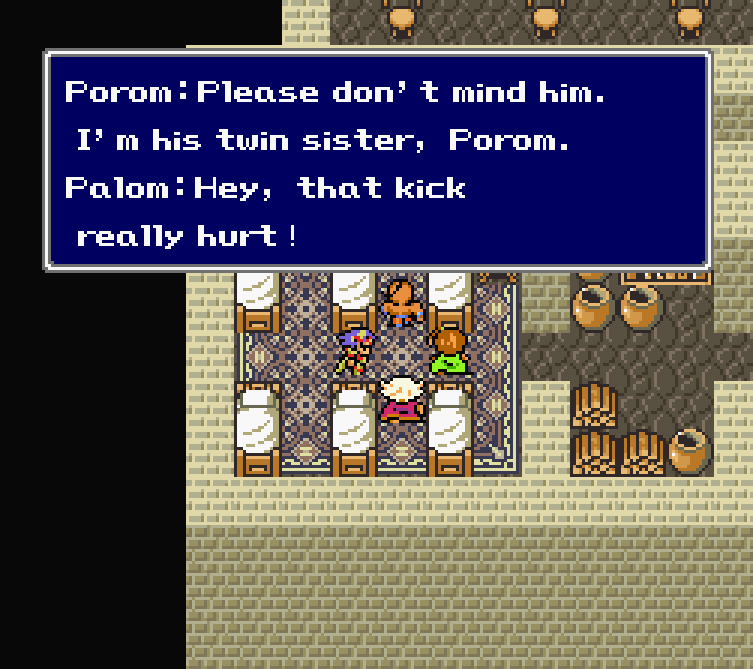
I haven’t gone through the PlayStation translation in great detail, but it seems like whenever I do, it feels like less a translation and more like someone unfamiliar with Japanese just tried to “punch up” the Super NES translation’s script. This is another example of that.
Again, for fun, I decided to see what the J2E fan translation did here. It’s equally as off-the-rails: “I can see why you’re Cecil’s friend. Both of you were Baron’s puppets.”
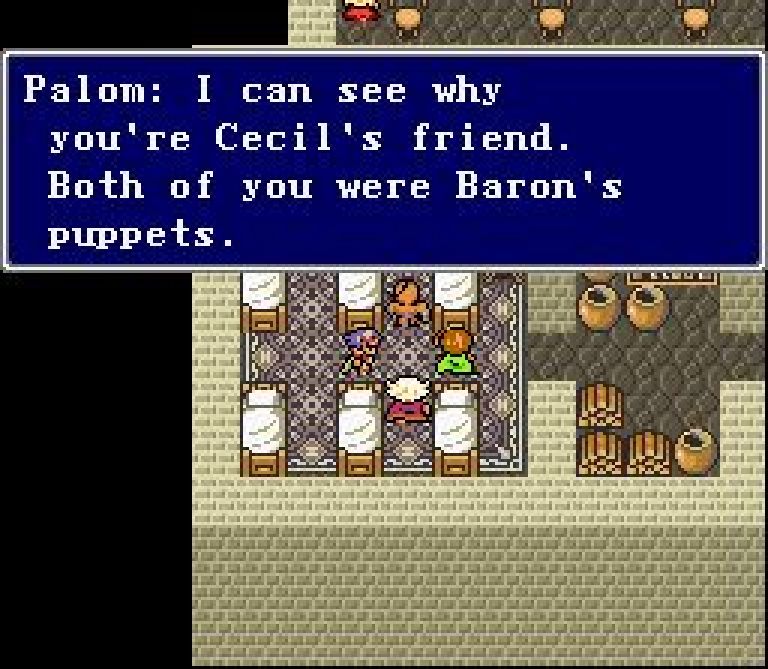
I can see what the J2E guys were trying to go for, but for what they touted as the most authentic Final Fantasy IV translation they sure took a lot of liberties.
 | 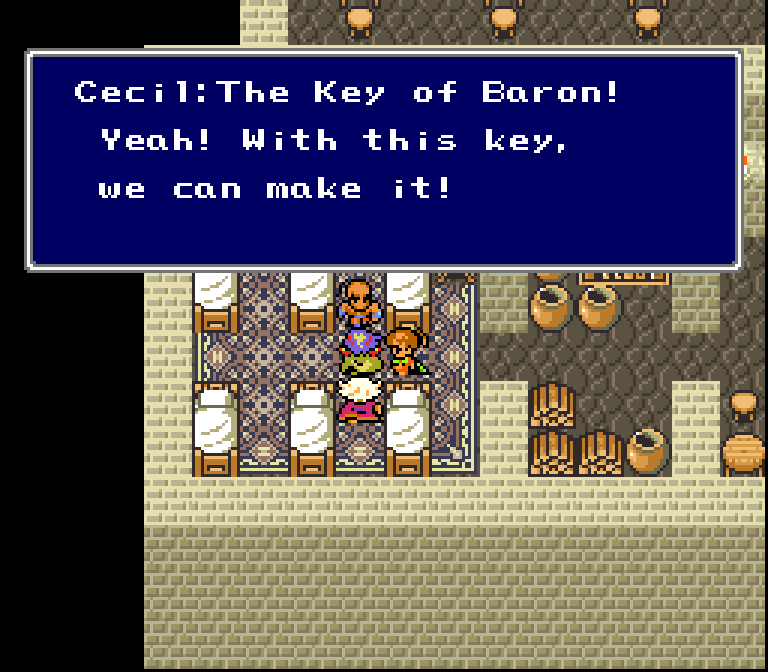 |
| Final Fantasy IV (Super Famicom) | Final Fantasy II (Super NES) |
Okay, back to the conversation again!
| Japanese Version (basic translation) | English Version |
| Porom: Palom! | Porom: Stop it, Palom! |
| Yang: I am deeply ashamed…. | Yang: I’m ashamed. |
| Cecil: In any case, we must rescue Cid…. | Cecil: Anyway, we must rescue Cid. |
| Tella: But I doubt it will be an easy task to get inside…. | Tellah: But it won’t be easy to sneak into the Castle Baron. |
| Yang: Hmm? What is this?! | Yang: What is this…!? |
| Cecil: This is the key to Baron! | Cecil: The Key of Baron! |
| Ah! | Yeah! |
| It’s because you were put in charge of the Royal Guards…. | |
| We might just have a chance! | With this key, we can make it! |
Here we see a few things worthy of note:
- This is going to sound really crazy if you’re not a translator, but I really like how the official translation goes with “must rescue” rather than “have to rescue” or “got to rescue”. This is because Cecil sometimes speaks in a higher-ranking, ever-so-slightly archaic style throughout the game, including here. Basically, he doesn’t talk like an average person using average speech patterns. If you were to talk like this in real life, people might smirk or laugh. Basically, Cecil, being a knight, sometimes speaks with a different tone than your average person or NPC might, and I can see it still reflected ever-so-slightly in the translation here.
- That said, the English translation then makes Cecil say, “Yeah!” a few lines later. I feel that choice of wording could’ve been improved. Of course, this is really, really super-nitpicky stuff that doesn’t matter much for the story or anything. In fact, I only notice these changes now that I’m comparing them side-by-side in such crazy detail.
- Cecil’s line about where the key to Baron came from is completely missing in the English translation. It even makes it less clear who had the key at all. Maybe it was even just sitting on a bed in the inn or something, you know? In comparison, the Japanese translation spells it all out in a logical manner.


![press start to translate [Final Fantasy IV] press start to translate [Final Fantasy IV]](https://legendsoflocalization.com/wp-content/uploads/2019/08/bbenma.png)
I think it adds to the scene with Yang that he appears to use a sword, as in that video of the restored dialogue, even if it isn’t intentional on the part of the developers. It seems to suggest further that Yang’s true self has been buried in service to Baron’s puppet government. He’s still plainly a master of martial arts, but Baron isn’t so cosmopolitan that they fully realize what that means (and its secret rulers would want Yang’s mind and abilities repressed anyway, if they’re even at all aware of who he is). So, the Baronians put a sword in Yang’s hand as an officer of the Royal Guard, even though he’d be a far more powerful fighter without one.
It’s the sort of touch you could easily imagine in a TV show: a character know for his fighting fists waving around an enemy military’s regulation sword instead, a sign of how his amnesia has suppressed his true and noble power.
For Text Compaction, we don’t know if Cid is locked up because he hid the airship, or because he was simply standing up to the king. Cid could have hid the aiship (remember that he never wanted it to be used to kill people), then objected to the king.